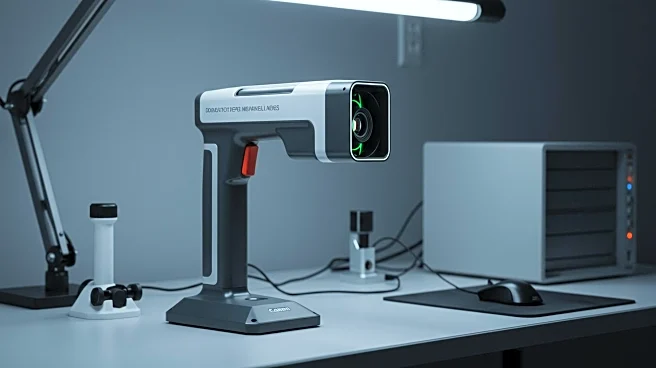What's Happening?
Revopoint has launched its latest 3D scanner, the Trackit, which is designed to cater to professional users with its advanced markerless scanning technology. The Trackit is equipped with a dual-camera base station that allows for precise tracking of the handheld scanner in 3D space, eliminating the need for traditional scanning markers. This feature is particularly beneficial for professionals involved in reverse engineering, as it simplifies and speeds up the scanning process. The scanner is capable of capturing both small and large objects with high accuracy, making it a versatile tool for various industrial applications. However, its high price point of $4,980 makes it less accessible to hobbyists who may not require its full range of capabilities.
Why It's Important?
The introduction of the Revopoint Trackit represents a significant advancement in 3D scanning technology, particularly for industries that rely on precise and efficient scanning processes. By removing the need for markers, the Trackit reduces setup time and potential errors, thereby increasing productivity for businesses involved in design, engineering, and manufacturing. This innovation could lead to cost savings and improved workflow efficiency, making it an attractive option for small businesses and professionals who require high levels of accuracy in their work. The scanner's ability to handle a wide range of object sizes further enhances its appeal to industries that deal with diverse scanning needs.
What's Next?
As the Revopoint Trackit enters the market, it is likely to attract attention from professionals seeking to upgrade their scanning capabilities. The company may focus on expanding its market reach by targeting industries that can benefit from its advanced features. Additionally, Revopoint might consider developing more affordable versions of the Trackit to cater to a broader audience, including hobbyists and smaller businesses. The success of the Trackit could also prompt competitors to innovate and introduce similar markerless scanning technologies, potentially leading to further advancements in the 3D scanning industry.
Beyond the Headlines
The shift towards markerless scanning technology raises questions about the future of traditional scanning methods and the potential for further automation in the industry. As more companies adopt such technologies, there may be a growing demand for skilled professionals who can operate and maintain these advanced systems. Additionally, the environmental impact of manufacturing and disposing of scanning markers could be reduced, aligning with broader sustainability goals in the tech industry.










